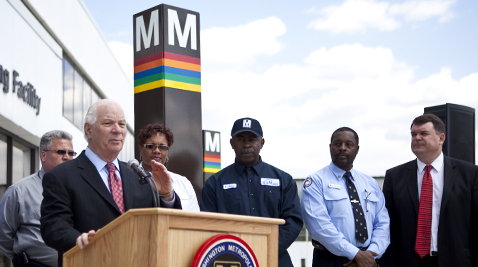HYATTSVILLE – Metro’s funding for safety improvements could be in jeopardy without passage of the federal transportation bill stranded in the House of Representatives, said Sen. Ben Cardin.
Cardin, D-Md., along with Washington Metropolitan Area Transit Authority officials, on Tuesday urged the House to pass the transportation bill that would bring funding to Metro to replace cars, buses, modernize facilities and improve safety.

“I know they’re taking steps to put the public safety first, but it’d be a lot easier if they had the predictable federal funding partnership,” said Cardin, who took a tour of WMATA’s training facility.
WMATA would use the $1.5 billion disbursed over 10 years to make improvements recommended by the National Transportation Safety Board after the Red Line crash between the Takoma and Fort Totten stations in June 2009 that killed nine people and injured 80.
“We cannot make these implementations without our relationship with Congress,” said Dave Kubicek, deputy general manager of operations.
Sixty miles of track will be brought to a “state of good repair” — meaning all switches, circuits, cross-ties and rail lines are functioning and well-maintained, according to WMATA spokeswoman Caroline Lukas.
The NTSB said the cause of the 2009 crash was a failure in the track circuits and WMATA’s failure to institute throughout the system an enhanced track circuit verification test, which was developed after a near-collision in 2005. The test would have detected the faulty circuit before the crash. The system is in now in place and awaiting NTSB review, Lukas said.
WMATA’s 35-year-old “1000 Series” cars were also cited by the NTSB as a factor in the severity of injuries because of “poor crashworthiness” shown in previous accidents.
The funding will replace the 1000 Series cars with 300 modern “7000 Series” cars that feature vinyl padded seats, carpeting, security cameras and LCD and video screens to track the train’s location.
WMATA will also rehabilitate 100 buses each year for six years. The improvements will include hybrid buses and updated mechanical and security systems. The 90-year-old bus facilities will also be rehabilitated. WMATA said the plans will increase safety and efficiency.
But WMATA won’t see the federal funding unless the bill passes the House.
The bill, Moving Ahead for Progress in the 21st Century, or MAP-21, passed the Senate 74-22 in March but House Republicans have prevented the bill from going to a vote.
House Speaker John Boehner refuses to bring it up for a vote because he knows there are enough supporters for the bill to pass the House, said Cardin.
“Instead he’s holding out for a partisan approach from the Republicans only — which won’t fly in the Senate … We need to work together, Democrats and Republicans,” said Cardin. “We broke through the gridlock — we passed by an overwhelming majority… The House needs to follow suit.”
Congress is in recess and no one could be reached in Speaker Boehner’s office Tuesday afternoon.
Maryland Republican Rep. Roscoe Bartlett of Frederick supports a compromise, said his spokeswoman.
“The House and the Senate need to resolve differences to produce a single consensus responsible transportation bill that will provide long-term certainty, reduce the size of government, eliminate earmarks and be fully paid for,” said Lisa Wright, Bartlett’s press secretary.
House Republicans were able to pass a short-term funding bill to prevent a shutdown of federally funded transportation projects in March, but Cardin said the success of the transportation programs lies in predictable, long-term federal support.
Safety improvements will continue even if MAP-21 fails and WMATA does not get the funding, said Lukas. The WMATA board would have to find another funding source, which could include additional revenue from jurisdictions as well as fare increases.
Federal funding “is definitely something that we need to maintain the pace and aggressiveness of repair … while that work would continue to be done … it just may affect the pace as which we do it,” said Lukas.
MAP-21 funds transportation programs nationally by reauthorizing the federal-aid highway program. The major highway programs in Western Maryland and the Eastern Shore along with those for the military base relocation in the Washington-Metro area could also be in jeopardy if the bill does not pass, Cardin said.
“I’ve talked to the state and they have so many more projects on hold because we don’t have a transportation bill reauthorized,” said Cardin. “It affects major maintenance, major highway, major bridge — all of that is directly affected by the failure of having a long-term reauthorization.”


You must be logged in to post a comment.